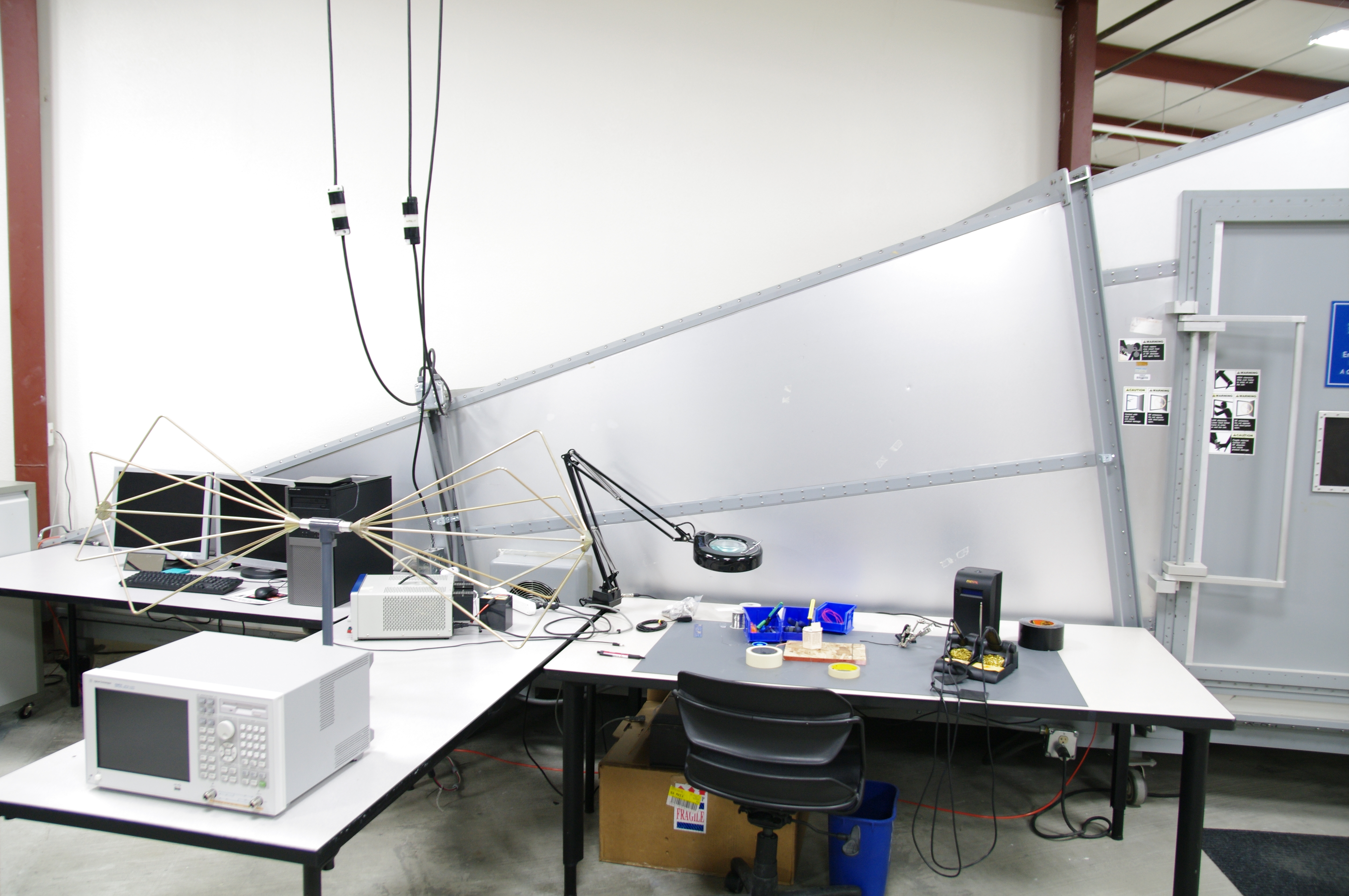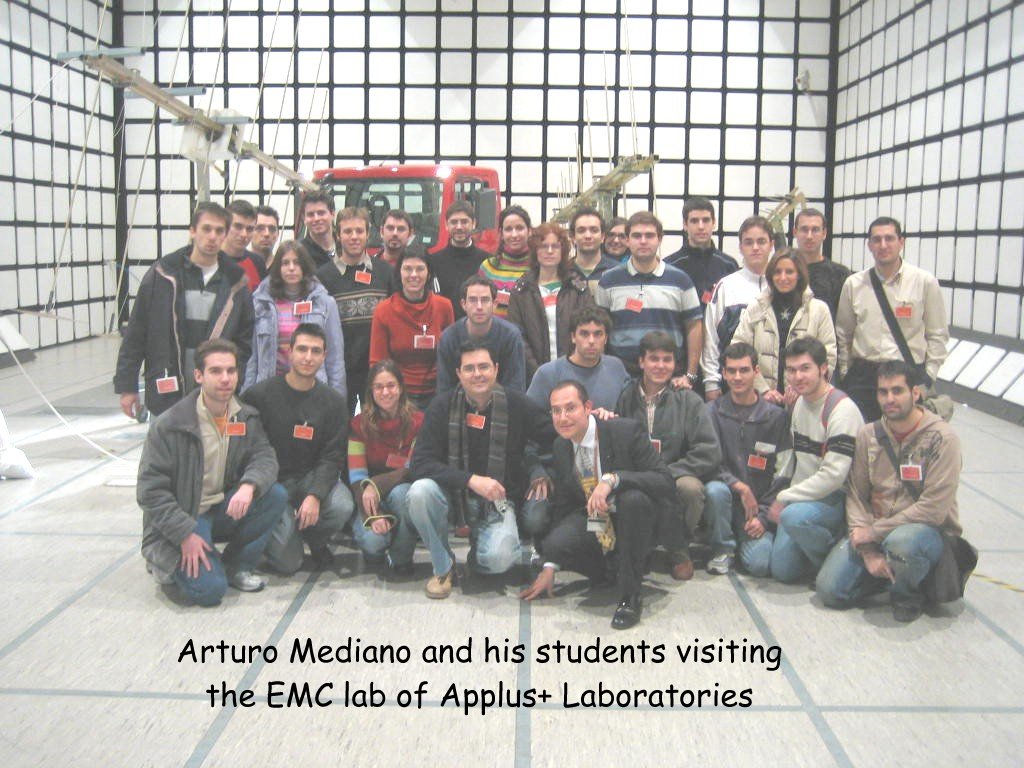Amsterdam University of Applied Sciences
Course # & Title: EMC 1 and EMC II
Location: Amsteram, Netherlands
Instructor: Cees Keyer
Course Level: Undergraduate
Frequency Course is offered: Second year of Electronic Engineering study
Course Description: EMC 1 is a course based on part one of Ott's book including practical
exercises based on the practical exercises from the University of Twente. EMC II is based on part 2 of the book.
Links:
Comments: In one semester the complete book is covered. First part is accompanied with fundamental exercises in the lab, for
example what is transfer impedance, what is the influence of a piggy
tail etc.
Students taking background noise measurements on Lake IJssel, Netherlands
Grand Valley State University School of Engineering
Course # & Title: EGR 643 – PCB Design and EMC
Location: Grand Rapids, MI
Instructor: Bogdan Adamczyk, Ph.D.
Course Level: Graduate
Frequency Course is offered: 2014 Winter Semester & every odd winter (2-year rotation) or on demand
Course Description: A
study of PCB design techniques for EMC compliance. Topics include:
digital circuit power distribution, effectiveness of decoupling
capacitors and embedded capacitance, digital circuit grounding, ground
plane current distribution and impedance, return current path, PCB
layout and stackup. Students will design a PCB and evaluate its EMC
performance.
Links: www.gvsu.edu/EMCcenter
Comments:
Course Topics:
Power supply decoupling (1 week)
Decoupling capacitors (2 weeks)
Embedded capacitance (1 week)
Digital circuit grounding (2 weeks)
Ground plane current distribution and impedance (2 weeks)
Digital Logic Current Flow (1 week)
Return Path Discontinuities (1 week)
PCB Layout (2 weeks)
PCB Layer Stackup (1 week)
Mixed-Signal PCB Layout (1 week)


GTEM Cell and test chamber in the EMC Lab at Grand Valley State University School of Engineering
National University of La Plata
Course Title: Design for Electromagnetic Compatibility
University: National University of La Plata
Location: La Plata, Argentina
Instructor: Ramon Lopez La Valle
Course Level: Graduate
Frequency: on demand
Course Description: Electromagnetic Compatibility fundamentals
and applications. Main topics include grounding, shielding, filtering,
digital power distribution and decoupling, circuit radiation, conducted
emissions, immunity, and PCB design.
Links:
Comments:

Professor Ramon Lopez La Valle (holding book) and students
University of Michigan-Dearborn
Course # & Title: ECE 319 - Electromagnetic Compatibility
Location: Dearborn, MI
Instructor: Mark Steffka
Course Level: Undergraduate elective
Frequency Course is offered: Fall semester
Course Description: This introduction to Electromagnetic Compatibility (EMC) will provide an
understanding of how electrical and electronic components either
generate or are affected by electric and magnetic fields. These topics
will be covered by suggested readings, in-class problem solving
sessions, demonstrations, lectures, and through the required lab sessions. The course is also
being planned to include a visit to local EMC testing facilities and
will also include "topical" class discussions by EMC professionals from
industry.
Links:
Comments:

University of Michigan-Dearborn Fall 2013 Electromagnetic Compatibility
class, with Professor Mark Steffka (far left) and author Henry Ott (far
right)
University of Zaragoza
Course # & Title: 67225 - Electromagnetic Compatibility and Electrical Safety
Location: Zaragoza, Spain
Instructor: Arturo Mediano, Ph.D.
Course Level: Graduate
Frequency Course is offered: September - January, annually
Course Description: This is an introductory course to the fundamentals
of EMI/EMC/SAFETY for the design and production of electronic products.
Links: http://titulaciones.unizar.es/asignaturas/67225/index14.html
(Information in that link is in Spanish. English version available upon request)
Comments:
History:
The course has been offered from 1994. First versions of the course were
related only to EMI/EMC but, from 2009 the contents were modified to include
70% material related to EMI/EMC and 30% related to Electrical Safety because of the
importance relation for both subjects in real world products.
The EMI/EMC part is focused to design techniques but measurement and legal topics are
introduced including two visits to external EMC labs.
Outline of the course:
PART I (70%): EMI/EMC DESIGN.
Fundamentals. Generation and coupling of EMI. Ground and earth. Filtering in EMI/EMC.
Design of PCBs. Shielding. Cables. Transients and protections. Diagnostic and troubleshooting
of EMI/EMC problems. EMC measurement and tests.
PART II (30%): ELECTRICAL SAFETY.
Risks of an electronic product (high voltage, danger with current, explosion,
high temperatures, fire, mechanical hazards, etc). Regulations. Technical
considerations (electrical insulation, materials, hot points, safety distances, ...)
Safety tests. Design techniques for electrical safety (critical Components, PCB (creepage
and clearance, ...). Cables. Enclosures.

Professional Development
Henry Ott Consultants in partnership with In Compliance Magazine Course Title:
Course Title: Electromagnetic Compatibility Engineering
Location: Varies across continental US
Instructor: Henry Ott
Course Level: Continuing Education
Frequency Course is offered: No longer offered
Course Description: This
course covers the practical aspects of noise and interference control
in electronic systems and provides a working knowledge of EMC
principles. the participants should obtain the knowledge necessary to
design electronic equipment that is compatible with the electromagnetic
environment and is in compliance with national and international EMC
regulations.
Links: www.hottconsultants.com/public.html
Comments: This
course is directed towards electrical engineers. However, mechanical
engineers, reliability and standards engineers, technical managers,
systems engineers, regulatory compliance engineers, technicians, and
others who need a working knowledge of electromagnetic compatibility
engineering principles will also benefit from the course.
Henry Ott Consultants
48 Baker Road, Livingston, NJ 07039
Fax: 973-533-1442
email: hott@ieee.org
January 29, 2019 (jw)